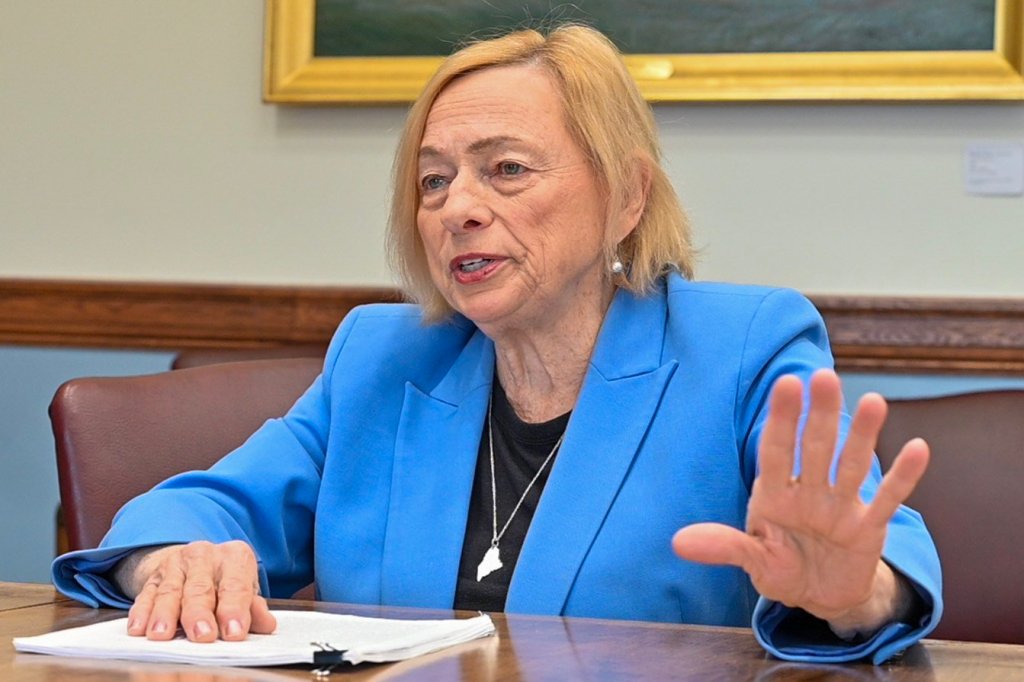Gov. Janet Mills on Friday outlined her opposition to a statewide referendum question this November aimed at allowing family and household members to initiate a process to temporarily remove firearms from someone deemed a danger to themselves or others.
In an opinion column published in the Press Herald, Mills wrote that Maine’s current yellow flag law, which she helped draft with gun rights and safety groups, has already proven effective in removing firearms from people in crisis while also protecting the Second Amendment rights of citizens.
“As a Constitutional matter, Question 2 is suspect,” she wrote. “As a practical matter, it is confusing, incompatible with our current law, and puts both police and civilians in greater danger.”
Mills had already made her opposition to red flag laws, or extreme risk protection orders, well-known. It was one of the reasons why lawmakers did not take floor votes on the proposal in 2024.
She has been fiercely protective of the compromise law that was enacted in 2019, which requires police to take a person into protective custody and coordinate a mental health examination before seeking a court order to remove access to firearms.
“We found common ground on one of the most controversial issues of our time,” Mills said, noting the current law was adopted nearly unanimously.
“Our law is not some cookie cutter measure copied and pasted from another state,” Mills said. “It was written by and for Maine people, carefully crafted to include important due process safeguards that protect both public safety and the rights of the individual.”
Supporters of Question 2 accused Mills of spreading misinformation by saying the red flag proposal does not have appropriate due process protections, and criticized Maine’s existing law as being ineffective.
“Gov. Mills co-authored Maine’s experimental law that failed to prevent the Lewiston tragedy,” said Nacole Palmer, director of the Maine Gun Safety Coalition. “It’s unfortunate that Gov. Mills is still insisting the law works and doubly unfortunate that she’s spreading misinformation about what Question 2 would do. The experiment failed — it’s time to accept that.”
Gun safety advocates for years have been trying to pass a red flag law, which exist in 21 other states and the District of Columbia. Interest was renewed following the 2023 mass shooting in Lewiston, which killed 18 people and injured 13 others.
Family members and friends had expressed concerns to law enforcement about shooter Robert Card’s increasing paranoia and threats. But law enforcement never used Maine’s yellow flag law to remove Card’s access to weapons. Instead, they asked family members to do it, but they were unsuccessful.
A special commission established to examine the circumstances of the shooting found that law enforcement should have used the yellow flag law.
Although use of that law was sparse prior to Maine’s deadliest shooting, it has been employed more than 1,000 times since.
Supporters of Question 2 argue that the Lewiston shooting is proof that Maine’s law needs to be changed to allow family and household members to initiate the process, since they would be the first to know if someone was at risk of harming themselves or others.
They also argue that requiring a mental health evaluation before seeking a court order to remove firearms unfairly stigmatizes people with mental illness, who are more likely to be victims of crimes.
Mills, however, argued that having police involved is important to having an effective — and constitutional — process for removing access to firearms. Involving police is also safer, she said.
“If there is a potentially dangerous situation, I want the police involved as soon as possible because it’s their responsibility — not yours — to deal with dangerous people,” she said.
Mills has yet to take a public position on referendum Question 1, which would require voter identification at Maine polls and make a number of changes to absentee voting.
However, her opposition to Question 2 is another example of how the Democrat has pushed back against her own party, which controls both the House and Senate.
It also comes as Mills is gearing up for a possible run for U.S. Senate against five-term incumbent Susan Collins. If she runs, Mills will need to be competitive in the 2nd District, a largely rural area with a long tradition of hunting that has voted for Trump in all three of his presidential campaigns.
Last year, she faced criticism from gun groups for allowing a three-day waiting period for purchases to become law without her signature.


We invite you to add your comments. We encourage a thoughtful exchange of ideas and information on this website. By joining the conversation, you are agreeing to our commenting policy and terms of use. More information is found on our FAQs. You can modify your screen name here.
Comments are managed by our staff during regular business hours Monday through Friday as well as limited hours on Saturday and Sunday. Comments held for moderation outside of those hours may take longer to approve.
Join the Conversation
Please sign into your CentralMaine.com account to participate in conversations below. If you do not have an account, you can register or subscribe. Questions? Please see our FAQs.